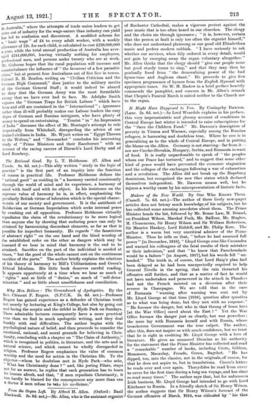The Rational Good. By L. T. Hobhouse. (G. Allen and
Unwin. Ss. 6d. net.)—This ably written " study in the logic of practice " is the first part of an inquiry into the function of reason in practical life. Professor Hobhouse defines the " rational good" as residing in " a harmony carried consistently through the world of mind and its experience, a harmony of mind with itself and with its object. In his insistence on the supreme value of harmony he is, in effect, emphasizing the peculiarly British virtue of toleration which is the special charac- teristic of our society and government. It is the antithesis of Bolshevism or German Imperialism which seeks internal peace by crushing out all opposition. Professor Hobhouse virtually repudiates the claim of the revolutionary to be more logical than anyone else by showing that enduring peace can only be attained by harmonizing discordant elements, as far as that is possible for imperfect humanity. He regards " the fanaticism of abstract right " on the one hand and the blind worship of the established order on the other as dangers which may be lessened if we bear in mind that harmony is the end to be attained. Sacrifice on the part of the individual is needed at times, " but the good of the whole cannot rest on the continuous sacrifice of the parts." The author briefly explains the relations of his theory of harmony to Mill's Utilitarianism and Green's Ethical Idealism. His little book deserves careful reading. It appears opportunely at a time when we hear so much of " rights " and so little of " duties," so much of " self-deter- mination " and so little about unselfishness and conciliation.


































 Previous page
Previous page